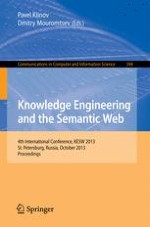2013 | Book
Knowledge Engineering and the Semantic Web
4th International Conference, KESW 2013, St. Petersburg, Russia, October 7-9, 2013. Proceedings
Editors: Pavel Klinov, Dmitry Mouromtsev
Publisher: Springer Berlin Heidelberg
Book Series : Communications in Computer and Information Science
